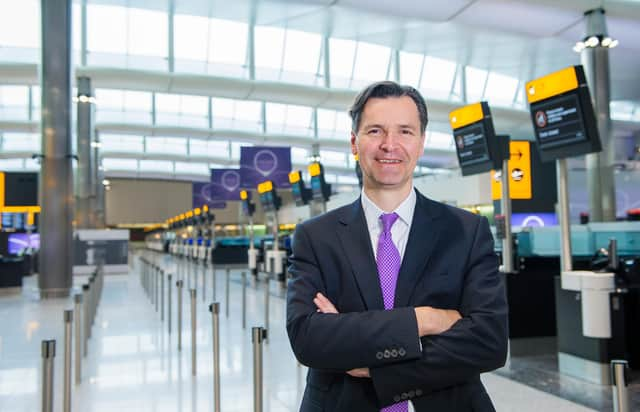We’re working to keep Scotland connected long after Covid-19 - comment


Prior to this outbreak, our sector thrived. At Heathrow, we celebrated increased passenger traffic to Scotland, boosted by Hogmanay festivities, and progressed our plans for carbon neutral growth by funding a regenerative carbon offsetting project near Dundee.
Across the UK, airports reported unprecedented demand. Airlines prepared to launch new routes to untapped markets that would take British goods to more parts of the world and bring back tourists and inward investment to our beautiful isles.
Advertisement
Hide AdAdvertisement
Hide AdThis feels like a lifetime away from our present reality, but as recently as January our industry was breaking passenger traffic records, announcing investments in the passenger experience and gearing up for even more growth as consumers and businesses alike set out to make the most of global connections.
By the end of January, the narrative had already begun to shift, as the aviation industry felt the first warning ripples of the initial outbreak, working with health officials on enhanced monitoring measures, and reacting to the first travel restrictions.
Progression
These initial piecemeal restrictions suddenly turned into widespread travel bans and grounded fleets, as this infection spread to more countries, affected more industries, and became a pandemic.
These concerns quickly affected the UK’s own domestic connectivity when FlyBe, Europe’s largest regional carrier, collapsed overnight after a fall in bookings. The airline connected Heathrow to Aberdeen and Edinburgh, helping Scottish businesses and passengers access more than 180 global destinations, with plans to boost these connections even further following our airport’s expansion.
Although load factors have decreased and the footfall in departure lounges has dropped, airports continue to have a crucial role in the fight against Covid-19, and many in aviation are working around the clock to keep vital supply lines open, supporting the nation’s effort in the battle against this pandemic.
Airports have always been instrumental in the delivery of time-critical and temperature-sensitive goods. This is why Scottish salmon is one of Heathrow’s top exports, and 41 per cent of the UK’s pharmaceutical imports arrived at our airport last year.
Crucial
Now, the role of air freight has become even more crucial, as key industries pull together during this difficult time to keep Britain’s supply chain moving, enabling frontline NHS workers to get the equipment they so desperately need, just as the service is scaled up to overcome the biggest challenge of our generation.
As a hub airport, we also play a crucial role in the swift and effective repatriation of British citizens. We stand ready to work hand in glove with the airlines, other UK airports and the government to make this process as safe and efficient as possible, but this will be challenging at best, and impossible at its worst without additional assistance.
Advertisement
Hide AdAdvertisement
Hide AdEven though our sector’s revenues have seen their steepest declines since records began, our costs have remained static and significant, threatening to cripple airports, airlines and the many businesses that make up the ordinarily prosperous aviation ecosystem.
The Edinburgh-based ground handling company Menzies Aviation has already warned of its potential collapse, unless it’s given a much-needed lifeline. This means that without additional support, a company that serves as the glue for both airports and airlines alike could cease to function, severely hindering our industry’s ability to support in the effort against Covid-19.
Scotland’s unique geography also makes the need for air connectivity even more pressing as connections to the nation’s offshore industries and island communities are more important now than ever.
During these unprecedented times, Heathrow is working to play our part, by prioritising flights with medical supplies and scaling up our cargo operations to ensure all corners of the UK are well-equipped in the fight against this pandemic. We are also determined to support Scottish airports and airlines where we can as we navigate this dynamic situation.
Loganair’s arrival at Heathrow is just one example of this. We have recently welcomed the Glasgow-based carrier to our airport for the first time in its 58-year history, as the airline works to keep open lifeline air services between London and the Isle of Man even after the closure of its usual base at London City Airport.
Call to action
Our teams have worked with the airline to ensure a smooth operation throughout this crisis, but more intervention is needed to maintain these essential routes that many depend on. Hopefully with the right measures we can guarantee that we continue to see Loganair’s tartan tailfin on the tarmac long after Covid-19 has relinquished its grip on the world.
Once the country has overcome this crisis, connectivity will be the catalyst that restarts the economy and kickstarts growth. Holyrood has shown tremendous forethought by deferring business rates, and we implore Westminster to follow their example, as this move helps to offer our industry some support during this turbulent time.
But more needs to be done to protect this sector and the many businesses that depend on it. Any alternative could prolong this pandemic’s impact on our economy, jeopardising an ordinarily successful industry that employs hundreds of thousands of people and puts Scotland’s exports on the map.
Advertisement
Hide AdAdvertisement
Hide AdMany commentators are pointing to the early warning signs of this pandemic that were not heeded. This needs to serve as a lesson to us all that we can’t afford to ignore the early warnings on climate change either. As we start to think about the path to recovery and how we will restart the economy, we need to consider how we can build back better.
For aviation, these considerations could be how can we accelerate the development of sustainable aviation fuels, which are critical to decarbonising flight. This is a sector in which Scotland could be a global leader, using its natural resources and low-cost energy to create a new export sector in synthetic and biofuels.
With a bold, pioneering vision, we can ensure that when the now-grounded fleets take to the skies again, our industry and our country will be stronger, more resilient and greener once this war is won.
John Holland-Kaye, CEO of Heathrow.
A message from the Editor:
Thank you for reading this story on our website. While I have your attention, I also have an important request to make of you.With the coronavirus lockdown having a major impact on many of our advertisers - and consequently the revenue we receive - we are more reliant than ever on you taking out a digital subscription.Subscribe to scotsman.com and enjoy unlimited access to Scottish news and information online and on our app. With a digital subscription, you can read more than five articles, see fewer ads, enjoy faster load times, and get access to exclusive newsletters and content. Visit www.scotsman.com/subscriptions now to sign up.
Our journalism costs money and we rely on advertising, print and digital revenues to help to support them. By supporting us, we are able to support you in providing trusted, fact-checked content for this website.
Frank O'Donnell
Editorial Director
